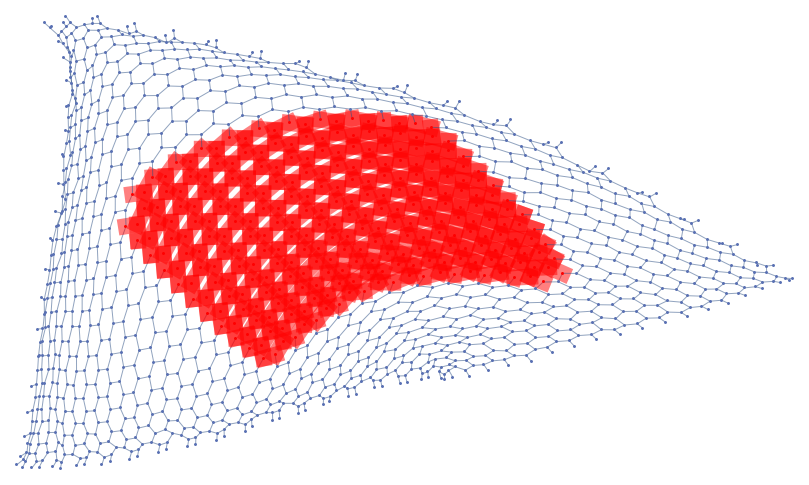Bundle of geodesics
Bundle of geodesics
Optimization
Optimization
In[]:=
mm=;
In[]:=
MinSumPermutation[mm_?MatrixQ]:=Module[{n,m,objective,constraints,vars,res,p},{n,m}=Dimensions[mm];objective=Total[Inactive[Times][p,mm],2];constraints={Table[Sum[Indexed[p,{i,j}],{j,m}]1,{i,n}],Table[Sum[Indexed[p,{i,j}],{i,n}]≤1,{j,m}],0p1};vars={Element[p,Matrices[{n,m},Integers]]};res=LinearOptimization[objective,constraints,vars];Flatten[SparseArray[p/.res]["NonzeroPositions"][[All,2]]]]
In[]:=
With[{perm=Echo[MinSumPermutation[mm]]},Sum[mm[[i,perm[[i]]]],{i,Length[mm]}]]
»
{6,12,5,9,2,3,13,10,16,4,7,1,19,8,17,14,18,15,11}
Out[]=
701
GeodesicsBundle
GeodesicsBundle
In[]:=
GeodesicsBundle[graph_,endpoints:{_Integer,_Integer},neighborhoodSize_:3,plottingFunction_:GeodesicsAll]:=Module[{neighborhoods,distanceMatrix,matchingEndpoints},neighborhoods=VertexList[NeighborhoodGraph[graph,#,neighborhoodSize]]&/@endpoints;distanceMatrix=Outer[GraphDistance[graph,#1,#2]&,neighborhoods〚1〛,neighborhoods〚2〛];matchingEndpoints=If[Dimensions[distanceMatrix]〚1〛≥Dimensions[distanceMatrix]〚2〛,Transpose[{neighborhoods〚1,MinSumPermutation[Transpose@distanceMatrix]〛,neighborhoods〚2〛}],Transpose[{neighborhoods〚1〛,neighborhoods〚2,MinSumPermutation[distanceMatrix]〛}]];plottingFunction[graph,matchingEndpoints]]
In[]:=
GeodesicsBundle[graph_,endpointFractions:{_Real,_Real},neighborhoodSize_:3]:=Module[{path,endpoints},path=FindShortestPath[graph,Sequence@@GraphAntipodes[graph]];endpoints=path〚Round[endpointFractionsLength[path]]〛;GeodesicsBundle[graph,endpoints,neighborhoodSize]]
In[]:=
GeodesicsBundle[graph_,neighborhoodSize_:3]:=GeodesicsBundle[graph,{0.2,0.8},neighborhoodSize]
GeodesicsAll
GeodesicsAll
In[]:=
ShortestPathsVertices[graph_,v1_,v2_]:=VertexList[graph]〚Position[MapThread[Plus,{GraphDistance[graph,v1],GraphDistance[graph,v2]}],GraphDistance[graph,v1,v2]]〚All,1〛〛
In[]:=
GeodesicsAll[g_Graph,vpairs:{{_,_}..}]:=HighlightGraph[g,Style[Subgraph[g,Catenate[ShortestPathsVertices[g,##]&@@@vpairs]],Thickness[.02],Red]]
Buckyball
Buckyball
In[]:=
Row[Show[GeodesicsBundle[BuckyballGraph[7,"Embedded"],#],ImageSize300]&/@Range[3,6]]
Out[]=
In[]:=
With[{ball20=BuckyballGraph[20,"Embedded"]},Row[Show[GeodesicsBundle[ball20,#],ImageSize300]&/@Range[3,6]]]
Out[]=
$Aborted
Hexagonal graph
Hexagonal graph
In[]:=
HexagonalGrid[width_?EvenQ, height_?EvenQ] := SimpleGraph @ GraphCatenate @ CatenateThread /@ TableIfEvenQ[i + Ceiling[i / width]], Int[i] If[i - width ≥ 1, Int[i - width], Ext[i]], If[i + width ≤ width height, Int[i + width], Ext[Mod[i - 1, width] + 1 + width]], IfMod[i, width] 0, Ext, Int[i + 1] , Int[i] If[i - width ≥ 1, Int[i - width], Ext[i]], IfMod[i, width] 1, Ext, Int[i - 1], If[i + width ≤ width height, Int[i + width], Ext[Mod[i - 1, width] + 1 + width]] , {i, 1, width height} /. Missing[] Ext[RandomInteger[{0, -1}]], Table Ifi ≤ width, Ext[i] Int[i], Ifi ≤ 2 width, Ext[i] Int[width (height - 2) + i], Ifi ≤ 2 width + , Ext[i] Int[(i - 2 width) 2 width - width + 1], Ext[i] Inti - 2 width - 2 width , {i, 1, 2 width + height}, DirectedEdges False
Quotient[i, width] + 4 width + height
2
Quotient[i, width] + 4 width + 1
2
64
2
height
2
height
2
In[]:=
GeodesicsBundle[IndexGraph[HexagonalGrid[36,36]],{713,730},3]
Out[]=
Similar effect seems to be happening to the spheres.
Discretized sphere
Discretized sphere
SpherePoints
SpherePoints
Random points
Random points
Maybe measure how they diverge statistically?
Partial conclusion
Partial conclusion
We are getting discretization effects: either due to (non-isotropic) grid, or due to randomness.
Mesh Ellipsoid
Mesh Ellipsoid
Ellipsoid diverge one direction vs. the other direction
Ellipsoid diverge one direction vs. the other direction
Cylinder growth going one or another way around the ellipsoid
Cylinder growth going one or another way around the ellipsoid
Network for deSitter or anti-deSitter space
Network for deSitter or anti-deSitter space

